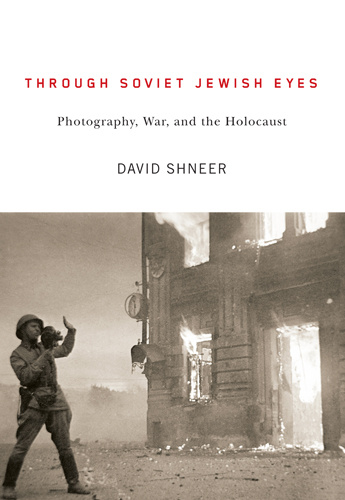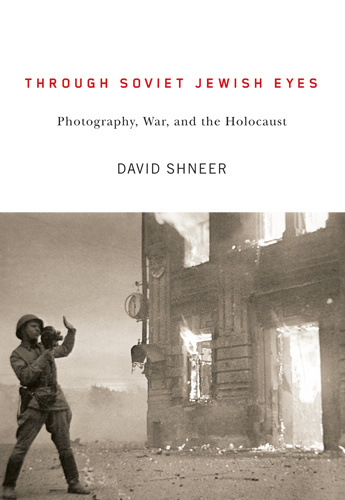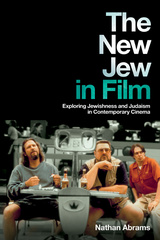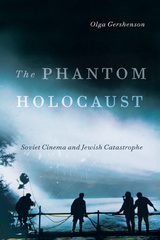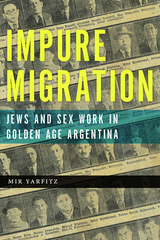Through Soviet Jewish Eyes
Photography, War, and the Holocaust
By David Shneer
SERIES:
Jewish Cultures of the World
Rutgers University Press
Winner of the 2013 Jordan Schnitzer Book Award in the category of Jews and the Arts
Finalist for the 2011 National Jewish Book Award in the Holocaust category
Most view the relationship of Jews to the Soviet Union through the lens of repression and silence. Focusing on an elite group of two dozen Soviet-Jewish photographers, including Arkady Shaykhet, Alexander Grinberg, Mark Markov-Grinberg, Evgenii Khaldei, Dmitrii Baltermants, and Max Alpert, Through Soviet Jewish Eyes presents a different picture. These artists participated in a social project they believed in and with which they were emotionally and intellectually invested-they were charged by the Stalinist state to tell the visual story of the unprecedented horror we now call the Holocaust.
These wartime photographers were the first liberators to bear witness with cameras to Nazi atrocities, three years before Americans arrived at Buchenwald and Dachau. In this passionate work, David Shneer tells their stories and highlights their work through their very own images-he has amassed never-before-published photographs from families, collectors, and private archives.
Through Soviet Jewish Eyes helps us understand why so many Jews flocked to Soviet photography; what their lives and work looked like during the rise of Stalinism, during and then after the war; and why Jews were the ones charged with documenting the Soviet experiment and then its near destruction at the hands of the Nazis.
Finalist for the 2011 National Jewish Book Award in the Holocaust category
Most view the relationship of Jews to the Soviet Union through the lens of repression and silence. Focusing on an elite group of two dozen Soviet-Jewish photographers, including Arkady Shaykhet, Alexander Grinberg, Mark Markov-Grinberg, Evgenii Khaldei, Dmitrii Baltermants, and Max Alpert, Through Soviet Jewish Eyes presents a different picture. These artists participated in a social project they believed in and with which they were emotionally and intellectually invested-they were charged by the Stalinist state to tell the visual story of the unprecedented horror we now call the Holocaust.
These wartime photographers were the first liberators to bear witness with cameras to Nazi atrocities, three years before Americans arrived at Buchenwald and Dachau. In this passionate work, David Shneer tells their stories and highlights their work through their very own images-he has amassed never-before-published photographs from families, collectors, and private archives.
Through Soviet Jewish Eyes helps us understand why so many Jews flocked to Soviet photography; what their lives and work looked like during the rise of Stalinism, during and then after the war; and why Jews were the ones charged with documenting the Soviet experiment and then its near destruction at the hands of the Nazis.
A fascinating and meticulously documented history.
Shneer’s book challenges the accepted rhetoric that came out of the Cold War's distortions of Soviet history. In particular, Shneer examines previously neglected work to show that the often-repeated claim that the Soviet Union’s attempt to cover up Nazi atrocities is not only untrue, but completely the opposite. Jewish photojournalists in Russia were able to keep Nazi atrocities on the front page and continually emphasized the Jewish aspect of Nazi violence.
Shneer has written a fascinating and ambitious book that deserves a wide readership among scholars of twentieth-century Jewish, Holocaust, East European, and Russian history. His pioneering chapters on the war years enhance substantially our understanding of the complex ways that Jews and non-Jews responded to the Holocaust.
Focusing on an area of Holocaust representation largely overlooked in the scholarly literature, this meticulously illustrated volume provides a wealth of information about individual Soviet Jewish photographers and their work. Shneer’s analysis integrates the work and the complex identities of photographers who documented both the construction and devastation of Soviet society, Axis atrocities against Jews and other Soviet civilians, and the Soviet defeat of the invaders
An excellent history of Jewish photographers in the Soviet Union from the Bolshevik revolution to the post-Stalin decades following WWII. Shneer not only traces the essential role Jewish photographers played in the creation of photojournalism in the Soviet Union, but also chronicles the manner in which these elite artists photographed the war against Nazi Germany (the book includes many rare photos). Highly recommended.
In this handsomely produced volume, David Shneer offers a compelling and nuanced analysis of how photojournalists plied their craft as photographers of the early Soviet experience. Through Soviet Jewish Eyes is as much about photojournalism as a profession as it is about documentation of the Holocaust and Soviet Jewish identity. A first-rate book that is intellectually ambitious, cogently argued, and analytically sophisticated.
Through Soviet Jewish Eyes is in a class all its own. Shneer’s sophistication in dealing with visual culture, in Jewish Studies and contemporary history, has few if any equals. In addition, it is one of the only studies of photojournalism that seriously engages ethnic difference and religious origins that often played significant roles in the evolution and life of the field. It is one of the most brilliant books, ever, in the immense field of media studies. It is difficult to think of any single work on photojournalism, in any national setting, that rivals Shneer’s deep archival forays, expert use of memoirs and interviews, and sharp analysis.
With this book Shneer has created a worthy tribute to these courageous photojournalists and to the survival of their legacy under extraordinarily difficult conditions.
David Shneer is Louis P. Singer Endowed Chair in Jewish History, Professor of History, Jewish Studies, and Religious Studies at the University of Colorado, Boulder. His books include Yiddish and the Creation of Soviet Jewish Culture, a finalist for the National Jewish Book Award.

